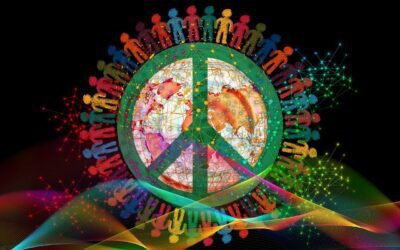Introduction
In the wake of the 21st century, the world has witnessed a paradoxical shift from globalization to fragmentation in international relations. While globalization promised increased interconnectedness and cooperation among nation. Whereas in recent decades we have seen a resurgence of nationalism, protectionism, and regionalism, leading to fragmentation of the global order. This shift has significant implications for various aspects of international relations, including economics, politics, religion, security, and culture. In this blog post, we will delve into the causes and consequences of this disintegration, examining its effects on the global landscape and future of mankind.
Globalization and Fragmentation

Globalization, as a concept, emerged in the late 20th century, driven by advancements in technology, communication, and transportation. It promised to create a borderless world, where goods, capital, and ideas flowed freely across national boundaries. The rise of multinational corporations, international trade agreements, and supranational organizations like the United Nations and the European Union epitomized this era of interconnectedness. The World Health Organization defines globalization as “the increased interconnectedness and interdependence of peoples and countries.” In other words, it is the process by which the cultures, economies, and political events in the world’s many countries have become dependent on one another.
However, the early 21st century has witnessed a reversal of this trend, marked by the resurgence of nationalism and the erosion of international cooperation. Factors such as economic inequality, cultural homogenization, and the uneven distribution of the benefits of globalization have fueled resentment and backlash in many parts of the world. This list of factors can go on because in my opinion this world did not change with time. We still believe and practice colonialism, racism and financial disparity / discrimination by some nations. It is not open but the agenda got disclosed at one point or the other. The 2008 financial crisis and subsequent economic downturns exacerbated these tensions, leading to a growing sense of disillusionment with the existing global order.
Causes of Disintegration

Disintegration is when one thing splits into parts or just ceases to exist. When something is destroyed, broken up into pieces, or falls apart on its own, that’s disintegration. Several factors have contributed to the disintegration of globalization and the rise of fragmentation in international relations. The developed world tried to have their control intellectually, politically and economically causing disintegration. Following are the few reasons:
1. Economic Inequality: Despite the promises of economic prosperity, globalization has widened the gap between the rich and the poor, both within and among nations. The concentration of wealth in the hands of a few global elites has led to widespread discontent among marginalized communities, fuelling populist movements and protectionist policies. Global wealth inequalities are even more pronounced than income inequalities. The poorest half of the global population barely owns wealth: it owns just 2% of the total. By contrast, the richest 10% of the global population own 76% of all wealth. On average, the poorest half of the population owns PPP € 2,900 per adult, i.e. $ 4,100 and the top 10% own € 550,900 (or $ 771,300) on average. The Middle East and the North Africa are the most unequal region in the world, whereas Europe has the least inequality.
2. Political Backlash: The erosion of national sovereignty and the perceived loss of control over domestic affairs have triggered a backlash against supranational institutions and international agreements. Brexit, the election of Donald Trump in the United States, and the rise of populist leaders in Europe are manifestations of this trend, where nationalist rhetoric often overrides multilateral cooperation. Another most recent example of Brussels plan to cripple Hungary’s economy if Hungary blocked aid package for Kyiv (The Telegraph 29 January 2024). The aim of any union is not to blackmail or restrict the freedom of action of any country but to cooperate and respect the decision of each member country.
3. Technological Disruption: The rapid advancement of technology, particularly in the fields of automation and artificial intelligence, has disrupted traditional industries and led to job displacement. This has created anxiety and insecurity among workers, contributing to a rise in anti-globalization sentiments and calls for protectionist measures to safeguard domestic economies.
4. Cultural and Religious Identity: Globalization has led to the homogenization of culture, with Western ideals and consumerism permeating societies worldwide. In response, many communities have sought to preserve their cultural identity and heritage, leading to a resurgence of nationalism and ethnonationalism. The “most basic symptom of the cultural disintegration is the feeling of meaninglessness and the resulting cynicism. Not only the religious symbols of earlier centuries have lost their power of giving a meaning to life, but also the philosophical and political symbols which were supposed to replace them.” The rise of Islamophobia and religious differences are growing concerns in the world. These differences are threat to the global peace and coherence. The world leaders and religious scholars need to address through international organisations to avoid further disintegration. All religious and ethnic groups should be afforded equal treatment for the betterment and prosperity of the world. However, international organisations appear to be ineffective due to various evident constraints.
5. Role of International Organizations: The international community is divided on the effectiveness of international organisations. So far the world have seen many wars, disputes and countries financially crippled even in the presence of these organisations. It is vital to study whether we still need to fund these organisations or not. These organisations are funded by countries, and in most of the cases the major donors influenced the working pattern and decision making of these organisations. The veto power countries influence the decisions at United Nations. and other International Organizations. This weapon of veto power must be abolished if we want a prosperous and just world. The major weaknesses are enforcement mechanism, Security Council inaction and western domination of UN institutions.
International Monitory Fund was created to help the developing and poor countries. So far the aid packages failed to help the weak economies, instead those countries were put under huge debt and recession.
Consequences of Disintegration:

The shift from globalization to fragmentation has far-reaching consequences across various dimensions of international relations. The objective of globalization was to integrate developing and impoverished nations, enabling them to access technology, financial assistance, healthcare, and foster social cohesion among their populace. This disintegration would definitely affect the poor states mainly in some of the below mentioned fields.
1. Economic Impact: The fragmentation of the global economy has disrupted supply chains, hindered trade flows, and weakened economic integration. Protectionist measures such as tariffs, trade barriers, and sanctions have exacerbated these challenges, leading to slower economic growth and increased volatility in financial markets.
2. Political Instability: The rise of nationalism and populism has eroded trust in democratic institutions and undermined the principles of liberal democracy. Authoritarian regimes have exploited these divisions to consolidate power and suppress dissent, leading to a rise in political instability and human rights violations in many parts of the world.
3. Security Threats: The breakdown of international cooperation has hindered efforts to address global security threats such as terrorism, climate change, and pandemics. Nationalistic policies and unilateral actions have undermined collective security mechanisms, leaving countries vulnerable to transnational risks that require coordinated responses.
4. Diplomatic Challenges: Fragmentation has strained diplomatic relations among nations, leading to increased tensions and conflicts over territorial disputes, trade disputes, and ideological differences. Multilateral forums and diplomatic channels have become less effective in resolving conflicts, as countries prioritise their national interests over collective goals.
5. Social and Cultural Division: The resurgence of nationalism and identity politics has exacerbated social divisions and polarisation within societies. Xenophobia, racism, and intolerance towards minority groups have increased, posing challenges to social cohesion and intercultural dialogue.
Conclusion
The shift from globalization to fragmentation represents a paradigmatic change in international relations, with profound implications for the global order. While globalization promised to create a borderless world of interconnectedness and cooperation, the reality has been one of increasing division and discord. Economic inequality, political backlash, technological disruption, and cultural / religious identity have all contributed to this disintegration, leading to a range of consequences across economic, political, security, and cultural dimensions.
Addressing the challenges of fragmentation requires a concerted effort to rebuild trust, promote inclusivity, and strengthen international cooperation. Multilateralism, diplomacy, and dialogue are essential tools for navigating the complexities of the current global landscape. The International Organizations need to work more proactively without any bias and pressure from any major international actors. Only through collective action and solidarity can we overcome the forces of fragmentation and build a more resilient and equitable world order.
As we navigate the uncertainties of the 21st century, it is imperative that we learn from the lessons of the past and work towards a future where globalization and fragmentation can coexist in harmony, fostering prosperity, peace, and mutual understanding among nations.





укладка кафельной плитки метр укладка пола кафельной плиткой цена
Скачать казино Онлайн казино
iphone 13 mini купить айфон 12 про цена
прокат красная поляна https://prokat-lyzh-krasnaya-polyana.ru
прокат лыж красная поляна прокат лыж красная поляна цены